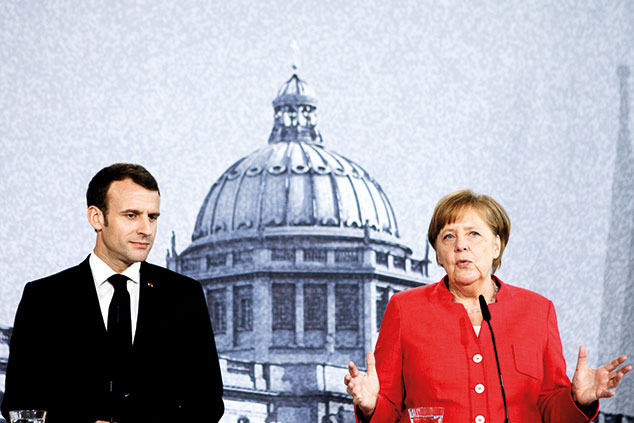
The French want radical reform; the Germans remain cautious. Emily Hohler reports.
“Italy’s populist revolt appears to have concentrated minds,” says The Times. Angela Merkel, the German chancellor, has addressed the issue of eurozone integration in an interview in Germany’s Frankfurter Allgemeine. This comes a full eight months after French president Emmanuel Macron’s Sorbonne speech urging “radical” reform to strengthen the structure of the single currency area, says Derek Scally in The Irish Times. It was delayed by the German elections.
One of Macron’s “headline proposals” was a plan to transform the ESM (European Stability Mechanism) bailout fund, born of the euro crisis, into a European Monetary Fund (EMF) to offer member states short and long-term loans in exchange for reforms. However, with Macron’s ideas often being framed as an attempt to “pickpocket German taxpayers”, Merkel is circumspect about the terms of the loans, the size of the pot and the EMF’s legal basis.
Berlin takes a hard line
To preserve the German veto, Merkel wants the EMF to be an intergovernmental body outside the EU treaty structure, says Ambrose Evans-Pritchard in The Daily Telegraph. The EMF would essentially replicate the existing system with a “new element that frightens Paris, Rome and Madrid”: she wants to “enforce private-sector haircuts and sovereign debt restructuring before any rescue”.
According to David Marsh, head of the Official Monetary and Financial Institutions Forum, Italy’s new populist government, which is “openly vowing to flout EU spending rules”, has “made it easier for Berlin to justify what it wanted to do anyway”. Although Merkel has “given the nod” to an investment fund for the eurozone, it would be introduced gradually and limited to the “low two-digit billions”, which falls far short of Macron’s proposal.
She “opened the door” to long- and short-term credit lines to help countries in difficulty, but was clear they would be conditional loans. Her views are closer to Macron’s when it comes to immigration and asylum policy, however, and she approves of his plans for rapid military intervention, says Constanze Stelzenmuller in the Financial Times.
In its bid to meet campaign promises, Italy’s new government is likely to “test Europe” on many of these issues, says Chico Harlan in The Washington Post. Although Merkel promised a “respectful approach” to Italy’s ruling coalition, she cautioned that the “principle of solidarity” should not “turn the single-currency bloc into a debt-sharing union”, say Joseph Nasr and Michael Rose on Reuters; the coalition had planned to ask the ECB to forgive $250bn of Italian debt.
Her vision of the EMF, note Guy Chazan and Jim Brunsden in the FT, “cleaves closely to the traditional German view that it should be a tool to strengthen budgetary discipline, rather than the new, bigger instrument for fighting financial crises in the eurozone” suggested by the French president.
Eurozone left in a weak spot
Merkel’s proposed investment budget and a “souped-up bailout fund” are “halfway measures” that will leave the Eurozone “ill-prepared for the next crisis”, says Neil Unmack on Breakingviews. Her caution is “understandable”. Her Christian Democrat party has “little appetite” for more integration and Italy’s new government, which wants to “unpick reforms and crank up deficit spending, makes it even less palatable”. But that “leaves the eurozone in a weak spot”.
The ECB has “less scope to fight the next crisis” and EU fiscal rules “limit governments’ ability to mitigate the next recession. The next economic downturn or crisis will test the eurozone to destruction”.